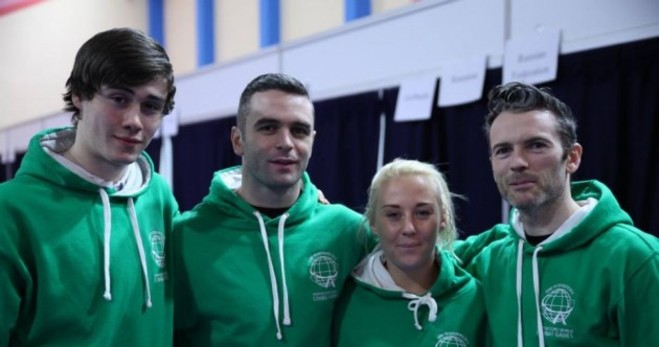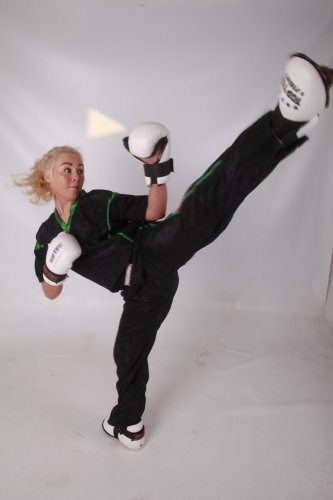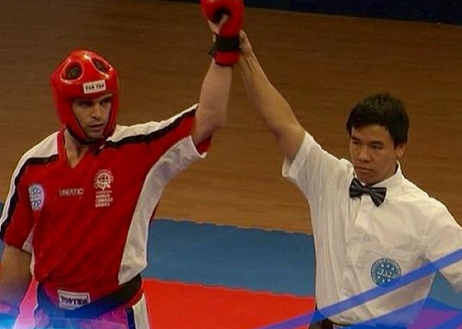Updated at 12.40
IF THERE’S ONE type of sport Irish people seem to thrive at, it’s competitive fighting.
Ireland’s success at boxing is well documented, having accumulated a number of Olympic medals in recent times, yet not as many people will be aware of the country’s proficiency in kickboxing.
Athletes in the sport, however, have been performing impressively for a number of years, and their most recent success occurred at last week’s World Combat Games in Russia, in which Mark McDermott of Blanchardstown and Sligoman Dessie Leonard received a silver and a bronze medal respectively for their efforts. Meanwhile, Lucan-born Robbie McMenamy and Tallaght native Shauna Bannon both succeeded in winning gold medals in their respective categories.
We spoke with the latter two fighters following their triumphant return home to Dublin a few days ago.
20-year-old Bannon, who defeated Gloria DeBei of Italy 13-10 in the final, said she was confident going into the tournament, as she has been competing in the sport for several years at both junior and senior level.
Bannon also explains how she has already triumphed at both the All-Irelands and the European Championships. And while there were a few unfamiliar fighters from the Asian and Pan American Games competing, she was familiar with the majority of her opponents, given that she spends much of the year travelling around Europe to participate in various events, rather than restricting herself to Irish tournaments, where the standard is considerably lower. Moreover, she had the advantage of knowing she could beat the Italian in the final, having done so already at the Europeans this year.
Indeed, it would be no exaggeration to label Bannon somewhat of a sporting prodigy, as she has been competing at World and European events at junior level since the age of 14, and was participating at senior level by the time she was 16, while already encountering significant success in her brief tenure in the sport.
“At the moment, I’d probably be the top woman in Ireland,” she adds. “At team events, there’s always one woman and three men, and I’d normally get picked for that.”
Like most athletes, Bannon dreams of one day representing her country at the Olympics, even though kickboxing is not currently accommodated at the event.
“There were loads of meetings on while I was over [in Russia], so hopefully they realise that the sport is good and it should be in the Olympics.“There’s so many different world championships but WAKO [World Association of Kickboxing Organisations] is the highest standard. You see people in the papers described as world champion kickboxers and you don’t even know who they are.
“I think that’s why the sport isn’t getting Olympic recognition — because of all the different organisations. I think over there, they realise that WAKO is the main organisation and hopefully now, it will get into the Olympics. I don’t think it’ll be in the next one, but hopefully it will be in the one after that.”
(Bannon practices her kickboxing technique)
Bannon also believes more needs to be done to help the sport by those outside of it, complaining that it receives no TV coverage aside from “about 30 seconds on Setanta the odd time”. She also admits to being somewhat envious of the far more generous funding that other countries tend to afford their competitors in the sport, compared with Ireland.
“If I was from Norway or Italy or Hungary or somewhere like that, I’d get so much money off their government to go to competitions throughout the year,” she says. “But we get no money off the Irish government. If I was from Norway and won, I would have got up to 70 grand. They get ridiculous amounts of money, but it’s just not recognised in Ireland.
“You get a pat on the back when you come home from winning a tournament, but you don’t really get much more from it. I find it so disheartening when I see someone else [from another sport] getting so much publicity. It’s good for the country, but it’s hard for us.”
Bannon explains that she’ll seldom have a moment to relax yet with the WAKOs in Turkey coming up at the start of December, and indeed since finishing a course in Leisure Management in college last May, she has had little time to focus on anything other than her training at Tallaght Martial Arts club. It’s certainly not through lack of effort that the sport isn’t as high profile as herself and others would like it to be.
“It’s been ongoing for the past two years. I’ve been training six times a week in the mornings and the evenings in the gym. And I have one rest day. But I’d be in the gym doing strength and conditioning stuff every morning. Then at night, pad work, technical stuff, and then at the weekends, we would have squad training, where I’ve been going out to meet different people from all over Dublin to spar with.
“I’ve been offered jobs that I’ve had to turn down because I want to focus on my training. I finished college last May and since then, I’ve been going flat out [with training]. The hours of the jobs just didn’t suit my training schedule and I just wanted to focus on the Combat Games.”
YouTube credit: Brannmanndan
The similarly driven McMenamy’s victory was perhaps less of a surprise, given that he had already won the same event in 2010. And on this occasion, he comfortably overcame Stella Neri of Italy 12-6 in the final.
“It’s a big achievement for people outside looking in,” he explains. “It’s a big name on the event like the world title. But I’ve been fighting at this level since I was 16, so it’s nothing new. It’s the same fighters — just a different venue. It’s the same buzz you get if you’re fighting an Irish Open tournament or an international tournament or an event like this.
“It’s just that people outside now give it more attention. For us it’s the same thing. We train the same. We fight the same. But more people get more excited about it because of the title that’s put on it.”
Yet this renewed success appears to have made a significant difference, as McMenamy says he notices a big change in people’s reaction compared with 2010.
“Winning the tournament is one thing, but how people react is another thing,” he says. “This, particularly more so than the 2010 one, has been publicised a lot more. This time we’re doing a lot of radio interviews and we’ve been featured a lot on online media as well. We’re getting good publicity — not as much as the boxers, but they’re funded by the government, and we’re not, because we’re not an Olympic sport. [Kickboxing is] fairly similar to the boxing — we just don’t get the recognition or the sponsorship they get.
“We’ve got more promoters. And one thing Irish people are good at is competitive fighting, whether it be boxing, kickboxing or taekwondo. It doesn’t matter at what level, Irish people are always good at fighting. In something like running, there might not be as high a standard. And I think they’re looking to promote something we’re good at.”
McMenamy also explains how a slight alteration in his training methods ahead of the event ultimately paid dividends.
“I’ve looked recently at more strength-based stuff. I joined a place called CrossFit Ireland out in Sandyford. It’s very high intensity training — like power lifts. You do all your Olympic lifts, your snatches, you’re climbing ropes, it’s very hardcore training. A beginner can do it, but for the likes of us, it’s very beneficial and I felt a huge difference in my fitness.
“I also met up every week with the Irish team and I teach at a martial arts club called Spartan Martial Arts out in Blanchardstown. Out of the nine Irish men fighters [at the Combat Games], five of them are from our club. It’s a pretty high standard, so we always get to train together.”
It has, of course, been a year in which traditionally low-profile sports have enjoyed high-profile successes — Rob Heffernan in walking and Annalise Murphy in sailing are two prime examples. Hence, does Bannon get inspired when he sees they type of impact their success can ultimately have?
“I don’t really look at other sports. The only other sport I’m into at the moment is kickboxing and CrossFit. Team sports have never been a thing for me because I know when I train and I know when I’m not training and I’ve never really relied on anyone else to do the work for me. So in a team sport, you don’t know what other people are doing and if they’re pushing themselves. With individual sports, you get what you put into it, so I’ve always preferred individual sports.
“But I think it’s great to see other Irish people being successful, because I think some Irish people think we’re not as good as the Americans, or we’re not as good as the Russians — [that attitude is] built into Irish people, but at the end of the day, they’re just people, so anybody can beat anybody.”
(McMenamy pictured celebrating his win in the final)
McMenamy’s current success is a far cry from his days starting out as a youngster in which he was, by his own admission, “a little fat kid”.
“One of my mates and me started going to the club round the corner from my house, and it just so happened to be one of the best kickboxing clubs in Ireland, if not Europe. The two coaches, Martin and Dave, they’re still my coaches, they took a lot of interest in me. They didn’t just turn up to training. They’d bring you to tournaments, they’d pick you up if you couldn’t get to training, they’d bring you home.
“And the actual camaraderie in the club was good. Even on days where you didn’t feel like training, you’d go, because you had friends up there. A lot of coaches are kind of like father figures as well. So it’s not just coaching kickboxing, you get a few life lessons thrown in along the way.”
McMenamy, who balances his training with 40-hour weeks in his regular job as a fire fighter and paramedic for Dublin Fire Brigade, is hopeful — like Bannon — that kickboxing will soon be an Olympic sport.
“I’d love it to be,” he says. “I think the sport would grow an awful lot more. There’s a lot of competitors that do some variation of kickboxing. I teach a class of 60 or 70 kids, but after a certain level, you do lose them to boxing, or taekwondo, because they’re Olympic-recognised and the parents are thinking about the Olympics. But a lot of the groundwork is done with the kickboxing.
“If it did get Olympic recognition, it would be huge for the sport. There’d be a lot more investment in the sport, investment in coaching and development. And no matter what tournament you go to — a Worlds or Europeans — an Irish person will come back with a gold. It’s something that Irish people are good at. It would be a better gamble to bet on that than say, the football team.”
YouTube credit: Brannmanndan
All pics used with permission from Shauna Bannon and Robbie McMenamy.
First published at 12.00



